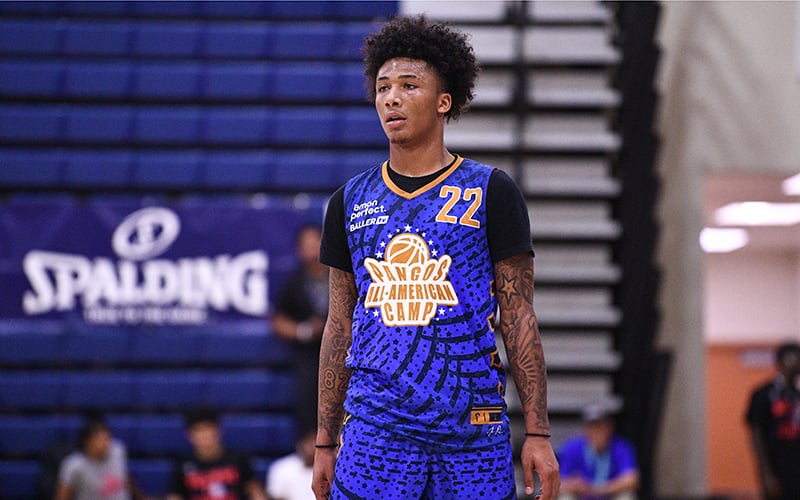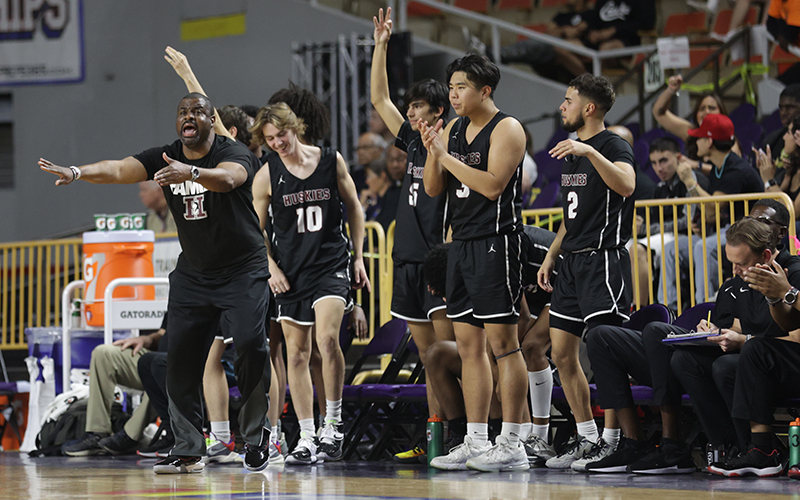
Mikey Williams, widely considered one of the top high school basketball players in the country, is expected to compete in this week’s Section Seven tournament with his team from San Ysidro High School in California. (Photo by Brian Rothmuller/Icon Sportswire via Getty Images)
PHOENIX – More than 500 college coaches will be at State Farm Stadium from Thursday through Sunday to watch 229 teams from around the country battle on 12 courts in the premier tournament for all of Arizona high school basketball: Section Seven.
In 2018, the NCAA changed rules regarding recruiting in men’s college basketball, hoping to create more opportunities for high school athletes to play on high school teams in front of Division I coaches.
To make the most of these changes, David Hines, executive director of the Arizona Interscholastic Association, and Matt King, executive director of the Arizona Basketball Coaches Association (ABCA), came together and formed the idea for the Section Seven tournament.
King has worked for years to help expand the high school basketball scene in Arizona. In addition to being executive director of the ABCA, he also holds a seat on the executive board of the National Basketball Coaches Association.
King is one of the founders of the Section Seven tourney, but it has taken a village to create such an event.
“There have been a ton of people involved in this,” King said. “This has really grown into something that’s bigger than me, bigger than the ABCA. It’s really something that has required a large group of people to collectively work together.”
The Section Seven tournament – named after the section of the National Federation of State High School Associations that includes Arizona – has grown exponentially since its first tournament in 2019, which was held at 10 metro Phoenix high schools. This premier tournament now is held at State Farm Stadium in Glendale, home of the Arizona Cardinals and setting for the NCAA Men’s Final Four in 2017.
Section Seven has become so visible that it has created a new set of challenges, one being exclusivity.
“We tell a lot of really, really good teams they can’t come and that’s hard,” King said. “There’s a lot of kids who are very deserving to play in front of college coaches, and I believe they will get that opportunity, it just might not be at Section Seven. I didn’t get into this business to tell kids and coaches ‘No,’ and that’s no fun. But we find ourselves having to do that more and more now.”
Coaches from around Arizona, including Raymond S. Kellis boys coach De’Rahn Stinson, are thrilled with the Section Seven.
“This is a great opportunity for players to come and get a lot of exposure in front of college coaches,” Stinson said. “Many kids play different roles with their high school teams than they do in club, and this gives them a unique opportunity to showcase themselves in those different roles.”
Stinson also noted that kids who can’t afford to play for premier club programs may have missed out on playing in front of college coaches. Section Seven offers a new opportunity for these athletes to compete for college scholarships.
Charles Wilson, now the coach of the Sandra Day O’Connor girls team, was an assistant with the Millennium girls team last year when they won the first ever Section Seven 16-team “admiHER” women’s championship.
“It was a great opportunity for the girls to showcase themselves on that platform,” Wilson said. “It brings out the best side of girls basketball because you can’t help but play into the atmosphere of what’s going on around you.”
Although Section Seven competitors include both boys and girls teams, it isn’t a live period for women’s college basketball recruiting, meaning that women’s college coaches can’t recruit at this event.
A major hope for the future of Section Seven is to change that and give the girls the same opportunity the boys receive. Work is being done behind the scenes by Matt King and the Section Seven staff to make this a reality.
“We have been enormous activists for the women’s side of the June scholastic events and I’d like to say we are a part of the reason why there is going to be women’s June live periods next year,” King said. “I’ve had conversations with the WBCA, the women’s Division I oversight committee, the NCAA, the NFHS and more. We have been pushing for the women’s side from the beginning, and we’re thankful that there is momentum towards change happening.”
King made one thing clear: The whole team wants nothing more than to have equal opportunity and equal representation for both sides of high school hoops.
“If there’s anything the ABCA is passionate about right now, it’s,’How do we continue to grow the women’s side of the game?’” King said. “As soon as we get the OK, we will go at that with a full head of steam.”
A goal this year was to make the tournament an easier experience for all spectators. One change that they are very proud of is that they have made admission for spectators entirely free.
Another change was the creation of Championship Courts, where from 3 to 10 p.m. on courts 4 and 9, fans can watch a cycle of teams that feature at least one top prospect.

